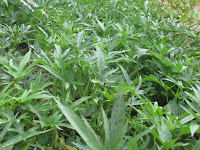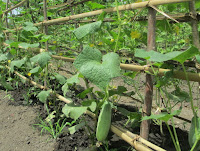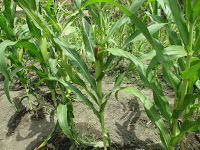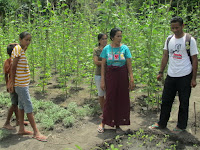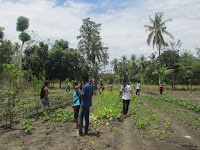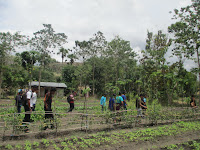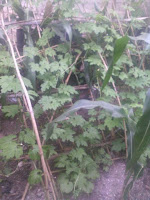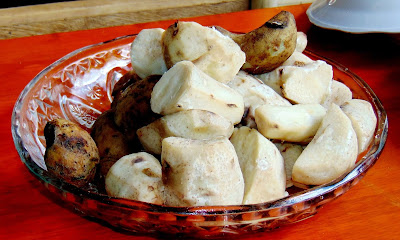A follow-up activity of organic agriculture training Come, Learn and Practice Wangga, September 24, 2016
Monday, 26 September 2016by adminstube
Exposure is a learning process in which the participants interact and learn directly about the topic of learning. Suchlearning brings great benefits to the participants, because they are directly involved in the learning process in order to get experience of discovering new things. Exposure is usually held in a specific place related to the topic as the complement of the learning process itself.
The learning process in Stube-HEMAT Sumba through training on Organic Agriculture: Food Diversity which held in GKS Kawangu, East Sumba, on September 16-18, 2016 with a theme ‘Do you want to eat? Rice is not the absolute one’ was continued on Saturday, September 24, 2016 with exposure to Women Farmers Group (KWT) Rinjung Pahamu, in Wangga, Waingapu.
 Twenty-four participants, mostly students, accompanied by Yulius Anawaru and Apriyanto Hangga, both were team members of Stube-HEMAT Sumba, visited this Woman Farmer Group which is chosenas the exposure destinationbecause its independence in managing vegetable garden consisting of various types of vegetables such as beans, white vegetables (cabbage), eggplant, tomatoes, kale, papaya and gourd. Food crops is also available in the garden such as sweet potatoes (petatas), cassava and corns.
Twenty-four participants, mostly students, accompanied by Yulius Anawaru and Apriyanto Hangga, both were team members of Stube-HEMAT Sumba, visited this Woman Farmer Group which is chosenas the exposure destinationbecause its independence in managing vegetable garden consisting of various types of vegetables such as beans, white vegetables (cabbage), eggplant, tomatoes, kale, papaya and gourd. Food crops is also available in the garden such as sweet potatoes (petatas), cassava and corns.
 Naomi Tamar Pangambang, the leader of KWT Rinjung Pahamu invited the participants to visit the garden and discussed the farmer group. She presented the steps of cultivation and planting vegetables. First, clean the land to be used and make beds. Then sow some manure into seedbeds and leave them for two weeks. Second, while the fertilizer mixed with the soil, sow the vegetable seed into the nursery and water them regularly. The seedlings will grow in two weeks and ready to be moved to the seedbeds. Third, water the seedlings every morning and afternoon, loosen the soil and clean up the grass growing among the seedlings. Fourth, if there are symptoms of disease, spray pesticides from natural materials, such as fermentated gamal leaves, mahogany leaves, chilies and other materials. The process was carried out until the harvesting time.
Naomi Tamar Pangambang, the leader of KWT Rinjung Pahamu invited the participants to visit the garden and discussed the farmer group. She presented the steps of cultivation and planting vegetables. First, clean the land to be used and make beds. Then sow some manure into seedbeds and leave them for two weeks. Second, while the fertilizer mixed with the soil, sow the vegetable seed into the nursery and water them regularly. The seedlings will grow in two weeks and ready to be moved to the seedbeds. Third, water the seedlings every morning and afternoon, loosen the soil and clean up the grass growing among the seedlings. Fourth, if there are symptoms of disease, spray pesticides from natural materials, such as fermentated gamal leaves, mahogany leaves, chilies and other materials. The process was carried out until the harvesting time.
 After the observation and dialogue with Mrs. Naomi, the participants had lunch with corn rice, vegetables and potatoes from the garden. Actually, there are many advantages having vegetable garden independently, such as vegetables availability, healthier vegetables because of organic treatment, lower cost for buyingvegetables and ability to learn in planting crops. After the exposure the participants were challenged to bring out their creative ideas utilizing their house yard into home vegetable garden.
After the observation and dialogue with Mrs. Naomi, the participants had lunch with corn rice, vegetables and potatoes from the garden. Actually, there are many advantages having vegetable garden independently, such as vegetables availability, healthier vegetables because of organic treatment, lower cost for buyingvegetables and ability to learn in planting crops. After the exposure the participants were challenged to bring out their creative ideas utilizing their house yard into home vegetable garden.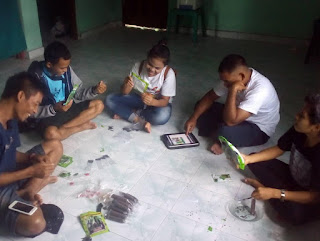 Returning from Wangga, the participants gathered at the secretariat of Stube-HEMAT Sumba and thought what they have learned and committed to begin cultivate their yard become small garden. At the first step, Stube-HEMAT Sumba team provided seeds of vegetables such as kale (water spinach), mustards, spinach, eggplant, gourd and sweet potatoes (petatas) and they chose their own seedlings to be planted.
Returning from Wangga, the participants gathered at the secretariat of Stube-HEMAT Sumba and thought what they have learned and committed to begin cultivate their yard become small garden. At the first step, Stube-HEMAT Sumba team provided seeds of vegetables such as kale (water spinach), mustards, spinach, eggplant, gourd and sweet potatoes (petatas) and they chose their own seedlings to be planted.

 Jufri Adipapa, a student of Unkriswina utilized the yard of Stube-HEMAT Sumba’s secretariat to plant corns, chili, eggplant and melon. Marten Rangga Mbani, one of the participants from STT Terpadu who lived in Mboka Waingapu planted spinach, green mustards, spinach and petatas. He harvested well green mustards but not for the water spinach because of lack of water, while it still needs time for harvesting sweet potatoes. Yati and Meli in STT GKS Lewa harvested sweet potatoes, while Desri and Naomi in Waingapu had crop failure because their vegetables were eaten by goats.
Jufri Adipapa, a student of Unkriswina utilized the yard of Stube-HEMAT Sumba’s secretariat to plant corns, chili, eggplant and melon. Marten Rangga Mbani, one of the participants from STT Terpadu who lived in Mboka Waingapu planted spinach, green mustards, spinach and petatas. He harvested well green mustards but not for the water spinach because of lack of water, while it still needs time for harvesting sweet potatoes. Yati and Meli in STT GKS Lewa harvested sweet potatoes, while Desri and Naomi in Waingapu had crop failure because their vegetables were eaten by goats.
The success and failure in agriculture are part of learning. Keep the spirit and keep on trying. Learn from the agriculture experiences to reach independence and diversity of agriculture in our home. (TRU).
Do you want to eat? Rice is not the absolute one ORGANIC AGRICULTURE PROGRAM: Food Diversity
Monday, 19 September 2016by adminstube
Sumba is one island in East Nusa Tenggara province. Most of the people of Sumba live as farmers and do farming of rice and corn. Because dry season in Sumba is longer than any other regions, it requires certain types of crops which suitable to be planted in this area. The dependency on certain foodstuffs is risky if the crops failed due to weather and pests, as it happened in the past few years. Also the tendency to use chemicals to enhance crop production without thinking about the long-term effects.
 The people of Sumba should be aware to this situation, especially students, as Sumba next generation. There is a stigma that agriculture is considered unattractive, outdated and less prestigious, but actually people should be aware that farming is the backbone of a nation to survive.
The people of Sumba should be aware to this situation, especially students, as Sumba next generation. There is a stigma that agriculture is considered unattractive, outdated and less prestigious, but actually people should be aware that farming is the backbone of a nation to survive.Stube-HEMAT Sumba as a forum for mentoring students to think about it and equip them through a training on Organic Agriculture: Food Diversity, with a theme 'Do you want to eat? Rice is not the absolute one’. The training was held at GKS Kawangu, East Sumba on Friday-Sunday, September 16-18, 2016. The theme was chosen to trigger the creativity of youth to process food except rice, and to motivate them to optimize house yard into a productive garden.
 Thirty six students from various campuses in East Sumba attended the training. The facilitators are expert in the field of agriculture, such as Yulius Anawaru, S.P (team of Stube-HEMAT Sumba), Umbu Ndilu Hamandika, SP. MAP from Food Security Agency, Rahmat Adinata (organic agricultural practitioner) and Bambang Broto Kiswarno, an agricultural practitioner.
Thirty six students from various campuses in East Sumba attended the training. The facilitators are expert in the field of agriculture, such as Yulius Anawaru, S.P (team of Stube-HEMAT Sumba), Umbu Ndilu Hamandika, SP. MAP from Food Security Agency, Rahmat Adinata (organic agricultural practitioner) and Bambang Broto Kiswarno, an agricultural practitioner.
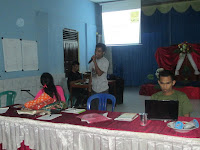
 The presentation of the participants of Exploring to Stube HEMAT Yogyakarta opened the training. They were Irmawati Rambu Konga (STT GKS Lewa) who learn sewing and making bags. Marten Rangga Mbani and Sumitro Umbu Ndamung (STT Terpadu) learned poultry and integrated farming. Frans Fredi (Unwina) practiced textile printing business and pins. Nikson KW Laki Hama (Unwina) learned rearing goat in pens and nutrition, and Krisna Hamba Banju (AKN) learned intensive swine breeding.
The presentation of the participants of Exploring to Stube HEMAT Yogyakarta opened the training. They were Irmawati Rambu Konga (STT GKS Lewa) who learn sewing and making bags. Marten Rangga Mbani and Sumitro Umbu Ndamung (STT Terpadu) learned poultry and integrated farming. Frans Fredi (Unwina) practiced textile printing business and pins. Nikson KW Laki Hama (Unwina) learned rearing goat in pens and nutrition, and Krisna Hamba Banju (AKN) learned intensive swine breeding. Yulius Anawaru, team of Stube-HEMAT Sumba, recalled the green revolution and its impact on Indonesia. Agricultural land was flooded with chemical fertilizers in order to increase crop production. The diverse foodstuffs were finally changed into absolutely rice. Local food then is not developed, even it is eventually forgotten. This should not happen and the organic agriculture movement must be continued and carried out by youth and students.
Yulius Anawaru, team of Stube-HEMAT Sumba, recalled the green revolution and its impact on Indonesia. Agricultural land was flooded with chemical fertilizers in order to increase crop production. The diverse foodstuffs were finally changed into absolutely rice. Local food then is not developed, even it is eventually forgotten. This should not happen and the organic agriculture movement must be continued and carried out by youth and students.Umbu Ndilu Hamandika, from Food Security Agency, East Sumba Regency invited participants to look back on food diversity in Sumba. In addition, it is important for them to pay attention to the quality and food safety for public consumption.
 "What is the purpose of farming or planting?" It was asked by Rahmat Adinata, a practitioner of organic agriculture and activist of organic farming to the participants. All participants were eager to answer, and most of them said for food sufficiency that has been sustainable for years as a livelihood. But, according to Rahmat Adinata, the most appropriate answer was harvesting. Indeed, being a farmer is not easy, starting from land cultivation to be ready for planting, preparing good seed, maintaining plants and so on. He conveyed the materials quite simply and participants got the materials well.
"What is the purpose of farming or planting?" It was asked by Rahmat Adinata, a practitioner of organic agriculture and activist of organic farming to the participants. All participants were eager to answer, and most of them said for food sufficiency that has been sustainable for years as a livelihood. But, according to Rahmat Adinata, the most appropriate answer was harvesting. Indeed, being a farmer is not easy, starting from land cultivation to be ready for planting, preparing good seed, maintaining plants and so on. He conveyed the materials quite simply and participants got the materials well.Agriculture could not be separated from pests. How can we solve it? Various methods of pest control was delivered by Bambang Broto Kiswarno and Abner HR Liwar. Interestingly, the ingredients to make organic pesticide was easily found in Sumba. Including eradicating locusts which broke out violently in East Sumba.
 However, participants were not just as listeners as they were motivated to practice the knowledge they have learned from the facilitators. Several college-based groups were made to do follow up by cultivating land, preparing the planting media and planting vegetables and petatas (sweet potatoes) in house yard. Finally, let us start food diversity, guys! (TRU).
However, participants were not just as listeners as they were motivated to practice the knowledge they have learned from the facilitators. Several college-based groups were made to do follow up by cultivating land, preparing the planting media and planting vegetables and petatas (sweet potatoes) in house yard. Finally, let us start food diversity, guys! (TRU).






